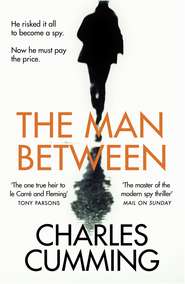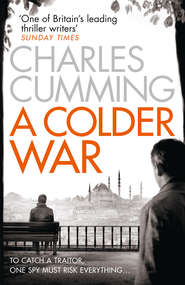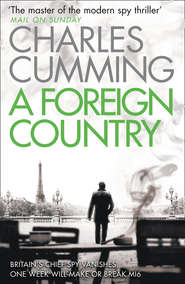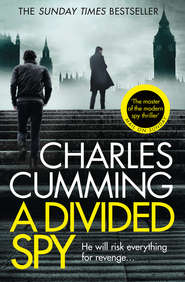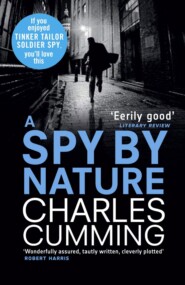По всем вопросам обращайтесь на: info@litportal.ru
(©) 2003-2024.
✖
The Trinity Six
Автор
Год написания книги
2018
Настройки чтения
Размер шрифта
Высота строк
Поля
At five to eleven, he walked upstairs. To his surprise, the first floor was not a large, open-plan area, comparable in scale to the ground floor, but instead a small, brightly lit room, no larger than the open-plan kitchen in his house, enclosed on all sides by shelves of travel guides and self-help manuals. There was one other customer present, a dreadlocked, tie-dyed girl of perhaps eighteen or nineteen who was working her way through a copy of South-East Asia on a Shoestring. Cross-legged on the floor, she looked up at Gaddis when he appeared at the top of the stairs, her mouth forming an acknowledging smile. Gaddis nodded back and took his copy of the Herald Tribune out of the satchel, preparing to make the signal. He tucked it under his arm, making sure that the banner was visible; the act of doing this felt both awkward and embarrassing and he drew a book at random from the shelves in front of him in an effort to make his behaviour appear less self-conscious.
It was a copy of Men Are from Mars, Women Are from Venus. Gaddis felt the dreadlocked girl staring at him as he tried to pin the newspaper under his left elbow while at the same time flicking backwards through the pages. A minute passed. Two. His arm began to ache and his face was flushed with an involuntary embarrassment. What would Neame make of him for reading such a book? He put it back on the shelf and transferred the newspaper to his right hand, feeling as though he was standing in the middle of some vast stage, overlooked by a crowd of thousands. Would Neame approach him in the presence of the girl? Would he make himself known with a nod of the head and expect Gaddis to follow? It was like performing in a play that he had never rehearsed.
At precisely eleven o’clock, a second customer, a shaven-headed man in his mid-twenties, appeared at the top of the stairs. What excitement Gaddis had felt at the sound of his approach quickly dissipated. He was wearing torn denim jeans, white Adidas trainers and a blue Chelsea football shirt with the name ‘LAMPARD’ printed across the back. Hardly likely to be an associate of Neame’s. Without making eye contact, the man moved past Gaddis and headed straight for a stack of cut-price paperbacks at the far end of the room. Gaddis felt that he should still be seen to be browsing and picked up a second book from the Self-Help section, again pinning the Herald Tribune under his elbow. This one was called Who Moved My Cheese?: An Amazing Way to Deal with Change in Your Work and in Your Life and Gaddis quickly replaced it with another day-glo paperback, this one entitled The Last Self-Help Book You’ll Ever Need, which at least brought a smile to his face.
What had happened to Neame? He looked back at the staircase but could see only promotional posters, a swaying light and a beige carpet worn by years of use. Five long minutes later, the dreadlocked girl finally stood up from the floor, put her guide to Asia back on the shelf, and went downstairs. Lampard was now his only companion.
Things happened quickly. As soon as the woman had gone, Lampard turned and walked directly towards Gaddis. Gaddis prepared to move to one side to allow the man to pass, but saw, to his consternation, that he was taking a piece of paper from his back pocket and attempting to pass it to him.
‘You dropped this, mate,’ he muttered, in a thick Cockney accent. Gaddis took the paper in a state of bewildered euphoria. Before he had a chance to respond, Lampard was halfway down the stairs, leaving only a cloud of BO behind him and a memory of his pale, undernourished face.
Gaddis unfolded the piece of paper. There was a short message, handwritten in a spidery scrawl:
GO TO THE CATHEDRAL. TURN RIGHT OUT OF WATERSTONES, LEFT INTO SOUTHGATE STREET. AT THE EXCHANGE PUB TURN LEFT INTO ST CLEMENT STREET. LEFT AGAIN AT BLINKERS. TURN RIGHT INTO THE HIGH STREET. GO AS FAR AS THE MEMORIAL AND TURN RIGHT AGAIN.
AT THE PASTIE SHOP, DRINK AN ESPRESSO AT CAFÉ MONDE. DO NOT SIT IN THE WINDOW OR AT ANY OF THE OUTSIDE TABLES. WHEN YOU LEAVE, TAKE THE AVENUE TO THE CATHEDRAL. SIT ON THE RIGHT-HAND SIDE OF THE NAVE, HALFWAY UP.
Gaddis read the instructions a second time. He had seen enough spy movies to realize that Neame wanted to ensure that he was not followed from Waterstone’s to the cathedral. Lampard was obviously a hired hand, a facilitator. An old man of ninety-one would not be capable of carrying out counter-surveillance of any kind; nor would he wish to expose himself in public without first being able to ascertain that Gaddis was bona fide. All of this seemed logical and straightforward, yet he felt a strange sense of unease, akin to a fear of the law, as he made his way to the exit, turning right into the pedestrianized high street. On Southgate Street, he checked the message a second time, unfolding it in a manner that he felt was certain to draw attention. He tried to make a mental note of its contents, but was forced to check them again at Blinkers, which turned out to be a small hairdressing boutique on a narrow road where sparrows hopped on the pavement and a young mother was pushing a pram. As he emerged from St Clement Street, Gaddis saw the entrance to Waterstone’s a few metres away and realized, with a dumb embarrassment, that Lampard’s directions had taken him in a simple clockwise loop.
He continued to walk downhill, as instructed, wondering how many eyes were watching him. He saw a narrow stone monument, about four metres high, on the right-hand side of the street. There was a shop selling pasties beside it and he concluded that this was the memorial mentioned in the note. Outside the pastie shop – a drifting smell of mince and curry powder – Gaddis found himself in a low, narrow alley which opened into a smaller, still pedestrianized street. The glass-fronted Café Monde was clearly visible a few metres to his left. He had no need for coffee – he’d drunk four cups in as many hours – but ordered an espresso all the same and took a seat at the back of the café, wondering how long he should take to drink it. He felt restless and pushed around, but was prepared to honour the tradecraft of Lampard’s note because it would surely guarantee a meeting with Neame.
After a minute of waiting, he drank the espresso, paid for it, and went outside. He had glimpsed the cathedral on his way into the café and now walked through the gates of a small park bisected by a tree-lined avenue, making his way towards the southern façade. Clumps of teenagers – French exchange students, anoraked Americans – were milling around outside, buffeted by an unruly wind. Gaddis was drawn into a short queue and paid five pounds to enter the cathedral. Whispers echoed off the vast vaulted ceiling as he walked between several rows of wooden chairs and took a seat on the right-hand side of the nave. He put his satchel on the ground, set his phone to mute, and looked around for Neame. There was an old, free-standing radiator next to his seat and he tapped his fingers against the scuffed iron as he waited. It was almost half-past eleven.
He had been seated for no more than a minute when he heard a noise behind him, the sound of a walking stick clicking briskly on stone. Gaddis turned to see an elderly man in a tweed suit moving towards him along the nave, his eyes catching a source of light as he looked up to greet him. The man was so close to Charlotte’s description of Thomas Neame as to remove all doubt about his identity. Gaddis began to stand, as a gesture of respect, but the old man made a brisk, sweeping movement with the base of the walking stick which had the effect of pushing him back into his seat.
Neame shuffled along the pew and settled beside Gaddis. He did so without apparent physical discomfort but was slightly breathless as he sat down. He did not offer to shake Gaddis’s hand, nor did he look him in the eye. Instead, he stared directly ahead, as if preparing to pray.
‘You’re not one of these Marxist academics, are you?’
Gaddis caught the ghost of a smile in Neame’s stately profile.
‘Born and bred,’ he replied.
‘What a pity.’ The old man moved a hand in front of his face, distracted by something in his field of vision. His back was stooped, the skin on his face and neck dark and loose, but he looked remarkably robust for a man of ninety-one. ‘Sorry about all the scurrying around,’ he said. The voice was imperially upper-class. ‘As you can probably understand, I need to be very careful who I’m seen to be talking to.’
‘Of course, Mr Neame.’
‘Call me Tom.’
Neame laid the walking stick across the three seats adjacent to his own. Gaddis looked at his hands. He was moving them constantly, as if squeezing a small exercise ball in the palm to strengthen the wrists. The near-transparent skin across his knuckles was as taut as parchment.
‘I don’t think I was followed here,’ Gaddis said. ‘Your colleague’s instructions were very clear.’
Neame frowned. ‘My what?’ He had not yet turned to face him.
‘Your friend from the bookshop. Your colleague, Lampard. The one wearing a Chelsea shirt.’
Neame generated a small but infinitely condescending silence before responding.
‘I see,’ he said. Now he turned, slowly, like a statue with a cricked neck, and Gaddis saw concern within the folds and lines of the old man’s face. It was as if he was worried that he had overestimated Gaddis’s intelligence. ‘My friend’s name is Peter,’ he said.
‘Is he a relative of yours? A grandson?’
Gaddis had no idea why he had asked the question; he wasn’t particularly interested in the answer.
‘He is not.’ Somebody, somewhere was dragging a steel trolley across a stone floor in the cathedral, the sound of the wheels squealing in the echo chamber of the nave. ‘You followed his instructions as requested.’
Gaddis couldn’t work out if Neame wanted an answer. He decided to change the subject.
‘As you can imagine, I have a lot of questions I’d like to ask.’
‘And I you,’ Neame replied. He turned to face the distant altar. There was already a tension between them, a fractiousness which Gaddis had not anticipated. He felt the gap in their respective ages as a chasm which he would struggle to cross, almost as if he was a small boy again in the presence of his grandfather. Neame was still exercising his hands, the counter to an apparent arthritis. ‘How did you come to hear about Eddie?’ he asked.
‘From Charlotte. She was one of my closest friends.’
Neame cleared a block in his throat. ‘Yes. I would like to express how sorry I was to hear about her death.’ The words sounded sincere. ‘A lovely girl. Very bright.’
‘Thank you. Yes, she was.’ Gaddis took advantage of the improving atmosphere between them to discover more about their relationship. ‘She said that she met you on several occasions.’
This was confirmed with no more than an abrupt nod. Neame then looked down at the satchel and asked if Gaddis was recording their conversation.
‘Not unless you’d like me to.’
‘I would not like you to.’ Again the response was quick and clipped; Neame clearly wanted to leave no doubt as to who was in charge. He winced as a sharp pain appeared to jag across his hunched shoulders, then quickly suppressed his discomfort with an almost imperceptible shake of the head. Gaddis recognized the familiar, uncomplaining stoicism of the war generation. His own grandfather had possessed it, his grandmother also. No fuss. No complaints. Survivors. ‘Charlotte visited me on three occasions,’ Neame continued. ‘I am resident at a nursing home not far from here. The Meredith. Twice we met at country pubs for a chat about Eddie, and once in my room. In fact, that occasion was rather amusing. She had to pretend to be my granddaughter.’ Gaddis thought of Charlotte engaged in the subterfuge and found himself smiling. It was the sort of ruse she would have enjoyed. ‘I must say that I was shocked when I heard that she had died.’
‘We all were.’
‘Do you suspect an element of foul play?’
Both the implication of the question and the calm, matter-of-fact way in which Neame had posed it took Gaddis by surprise. ‘Not at all,’ he said. ‘Do you?’
Neame sighed deeply in a way that Gaddis thought of as overly theatrical.
‘Well, I wouldn’t know, would I? But now you’re the man on the scene. You’re the chap tracking the story. And I suppose you want me to tell you all about Eddie.’
‘You approached me,’ Gaddis replied, because he was becoming slightly irritated by Neame’s manner. ‘You were the one who wrote the emails. You were the one who sent Peter. I have absolutely no idea how you knew that I was taking over from Charlotte. I can only assume that she told you we were planning to write a book together.’
‘That is correct.’ Gaddis did not suspect that Neame was lying. The metal trolley was again being dragged across a distant stone floor, the metal scream of wheels further adding to the combative atmosphere between them. ‘I’m assuming that you know about St Mary’s?’
‘I know about St Mary’s.’
Here at last was an area of the story with which Gaddis was familiar. The old man turned to face him again, a smell of lavender in the air. His teeth were faded to yellow-grey, his blue eyes as clear and as deep as stained glass.
‘Then you’ll know that Eddie’s death was a put-up job. You’ll know that the Office cooked the whole thing up to protect him.’
‘Protect him from what?’
‘Or from whom?’ Neame reached out to touch the handle of his walking stick. The answer to the question appeared to be as much of a mystery to him as it was to Gaddis. ‘All I know is that Eddie wanted to say goodbye. He told me what was about to happen. I knew that this would probably be the last time that I ever saw him.’






